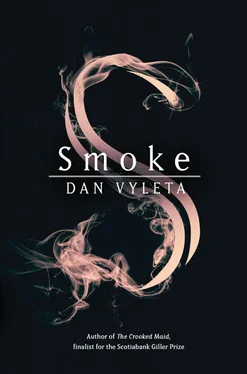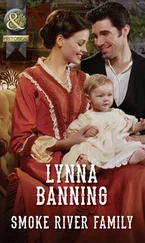“That you were stiff.”
“Stiff?”
“Yes. Stuck-up, I suppose. And pretty.”
“I suppose now that you can’t see me, I am merely stuck-up.”
“You are trying to be holy, that’s all. But it doesn’t suit you.”
“Doesn’t suit? You are saying I am bad at heart.”
He pauses over this, for longer than is comfortable. “Not bad, no. You are just yourself.”
And later: “We don’t choose how we are made.”
She moves away then, to be alone with her thoughts.
ф
Next time they speak, she finds herself punishing him for this “doesn’t suit.” It’s Charlie himself who gives her the opening. He wants to know about Thomas’s father: the details of his crime.
She does not immediately satisfy him with an answer.
“You don’t know?” she asks instead, as though overcome by wonder. “You are his best friend and you don’t know?”
“All he told me is that his father killed someone. I thought he would explain it, sooner or later. But he never did.”
It is only when she hears the hurt in Charlie’s voice that Livia realises what she is doing. And feels ashamed.
“I will tell you what Mother told me,” she offers. They are lying side by side on a blanket in one corner of the room. Their forearms very nearly touch; she can feel his hairs caress her skin. They have been doing this a lot lately: almost touch. If there were light by which to inspect, to judge herself, she would have condemned such licence. But in the dark their closeness has no censor.
“It’s like this. Thomas’s father got into a fight with one of his tenants who claimed Mr. Argyle had taken liberties with his wife. Apparently, he stormed into the public house in broad daylight and bashed in the man’s skull. He was arrested and tried, but then he died in prison before the sentencing could take place. ’Flu, Mother said. Thomas had just turned eleven.
“When the news reached her, Thomas’s mother was already sick. A growth on her chest. They were impoverished, the estate heavily in debt, but she refused all offers of help. It was thought that she had sent her son to a local school. Somewhere up north: a provincial establishment, for the children of the minor gentry. But she must have kept him instead, to look after her. He comes from an isolated place: no visitors, the closest neighbour twenty miles away. Nobody took any notice — nobody who mattered — not until she died. But when she did, lawyers got involved. Mother says they always do. The custody of the estate went to Thomas’s uncle — his father’s brother — until Thomas turns twenty-one. A Lord Wesley, of Pembrokeshire.
“Apparently Lord Wesley never went up himself. He sent a steward instead, to look after the estate. Mother says the steward found Thomas living alone on the grounds, holding court over a gaggle of village urchins. All the servants were gone. So the steward wrote to Lord Wesley who in turn wrote to Mother, and she arranged to have him bundled off to school.”
Charlie’s voice is incredulous. “I never heard a word about any of this.”
“You wouldn’t have. It was all carefully hushed up. A nobleman committing murder — impossible! Imagine the scandal, the implications if the story spread. So they bought off the witnesses and forbade all mention of the affair. Even the trial was held in secret. Mother only found out because, somewhere along the line, Thomas’s mother broke her vow of silence and sent her a letter.”
“Trout must know. Our headmaster. But he hasn’t told the other teachers. If he had, they’d have used it against Thomas.”
They are speaking in whispers, too low to be overheard. All the same, a cry issues from Thomas’s bed. When they run to his bedside, they find his face wet with blood or tears.
ф
Lizzy comes and goes. She makes little attempt to speak to Livia, and Livia finds herself avoiding her, avoiding Thomas. Moving away from them, sitting in darkness. Lizzy is the only one who always lights a lamp.
On occasion, though, Livia will linger and watch Lizzy tend to her patient, draw infection from the wound, spoon soup into the feverish boy. There is something more to Lizzy’s movements than solicitude. Even when she’s wiping off his pus. It worries, fascinates Livia.
Periodically, too, she forces herself to lend a hand in turning Thomas, or in changing his sweat-drenched bedding. When they are done, still squatting at his bedside, Lizzy makes a comb of her fingers, and runs it through Thomas’s tangled hair. Her eyes are on Livia. She speaks abruptly.
“You really don’t like him, eh? Well, can’t help your heart.” Lizzy spits, unselfconsciously, not intending any insult, merely clearing her throat. “How about Mr. Cooper, though? You’re sweet on him , ain’t you?”
“Sweet?”
The moment Livia says it she knows the tone is wrong, mistress speaking to servant. But here she is, a beggar in this house. Livia tries to summon the meekness she has spent years growing in herself. It never came naturally.
It doesn’t come now.
“He is a fine young man” is all she manages.
Lizzy snorts and for a moment Livia feels it, the commoner’s derision for a life where one does not dare put feelings into words.
ф
Thomas’s fever begins to ease. He remains weak, withdrawn, sleeping through three hours out of every four. But he’s on the mend. It forces Charlie and Livia to discuss the future. They have shied away from it thus far. Part of it is that Charlie reproaches himself. He says, “I should have stayed on top. Found out what was going on. Or made my way back to school and talked to Trout.”
Livia does not answer, hugs herself standing invisible in the blackness of the cave, a step from him, thinking: We would not know one another if you had stayed on top.
But Charlie’s thoughts remain far away.
“I could write to Ireland,” he says. “To my parents. Explain the situation, ask them for their help. The miners will post the letter.”
“Will they? Mr. Mosley would have to go to the post office in town. I doubt he keeps much correspondence. Somebody would notice. Better to keep quiet for a little longer. Lie low. Disappear.”
“Now you sound like Thomas. Suspicious. ”
She wants to tell him that it is more than that. That she has found something here, in the darkness, something she does not understand yet. But what she says is: “That’s because Thomas is right. He is in danger. They shot off half his face.”
But Charlie is too honest to let it go at that.
“If he’s wrong,” he says, “your mother will be going mad with worry. For all of us, but above all for you.”
Her reply is curt. “Mother won’t miss me. I’m a disappointment to her.”
“Why?”
“I don’t really know.”
She feels an anger burn in her so rich and thick it must coat her skin in suds. The feeling is quickly smothered by confusion when she feels something soft brushing her cheek, searching it, finding her mouth. Charlie’s lips are dry on hers. She moistens them with her tongue. Livia does not realise how close they are standing until she feels her chest pressed into his. It unlocks something in her that makes itself heard in a sigh, a whelp, the sound of a pup when you touch its belly while it’s sleeping. The sound scares her. She recoils, sniffing the air; feels a greed rise through her body, up the ladder of her rib cage; finds him once more, explores him with her face, her mouth, and for the first time in her life feels the need to nip, to bite another’s skin, cram his breath into her lungs. It lasts a moment. Then she remembers herself, walks away, licking her lips, her teeth, hunting for the taste of sin and finding only Charlie: the taste of sweat and coal dust, with a hint of the cold cabbage soup they ate for lunch.
Читать дальше












